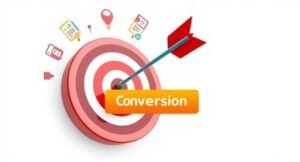Introduction
When it comes to growing an e-commerce business, two digital marketing strategies stand out: PPC (Pay-Per-Click advertising) and SEO (Search Engine Optimization). Both help drive traffic to your online store, but they work in different ways. Some businesses focus only on one, thinking they can get by without the other. However, the most successful online stores use both PPC and SEO together to maximize their visibility, sales, and long-term growth.
In this article, we’ll break down the key differences between PPC and SEO, their pros and cons, and why combining them is the best approach for e-commerce success.
1. What Is PPC?
PPC (Pay-Per-Click) is a type of online advertising where businesses pay every time someone clicks on their ad. These ads appear at the top of search engine results pages (SERPs) and on social media platforms like Facebook, Instagram, and TikTok.
How PPC Works
- A business creates an ad campaign targeting specific keywords.
- The ad is placed on search engines (Google Ads, Bing Ads) or social media.
- Every time a user clicks the ad, the business pays a fee.
Pros of PPC for E-commerce
✅ Instant traffic – Unlike SEO, which takes time, PPC brings visitors immediately.
✅ Highly targeted – Ads appear for specific audiences based on location, interests, and behavior.
✅ Measurable results – You can track clicks, conversions, and return on investment (ROI) in real time.
✅ Great for promotions – Perfect for seasonal sales, product launches, or limited-time offers.
Cons of PPC for E-commerce
❌ Costs can add up – If not managed well, ad spend can get expensive.
❌ Short-term impact – Traffic stops when you stop paying for ads.
❌ Competitive bidding – Popular keywords can be costly due to high competition.
2. What Is SEO?
SEO (Search Engine Optimization) is the process of improving your website to rank higher on search engines organically (without paying for ads). The goal is to attract more visitors by appearing in unpaid search results.
How SEO Works
- Businesses optimize website content with relevant keywords.
- Search engines crawl and index the site based on relevance and quality.
- Over time, the site ranks higher for specific search terms.
Pros of SEO for E-commerce
✅ Free traffic – Unlike PPC, organic clicks don’t cost money.
✅ Long-term benefits – A well-optimized site can generate traffic for years.
✅ Builds trust – Users tend to trust organic search results more than paid ads.
✅ Better user experience – SEO involves improving website speed, design, and content, which benefits visitors.
Cons of SEO for E-commerce
❌ Takes time – It can take months to see significant results.
❌ Requires ongoing work – Regular updates and content creation are needed.
❌ Algorithm changes – Google updates its algorithm frequently, affecting rankings.
| Feature | PPC (Pay-Per-Click) | SEO (Search Engine Optimization) |
| Cost | You pay for every click | Free clicks, but requires effort |
| Speed | Instant traffic | Takes time to rank |
| Sustainability | Stops when you stop paying | Long-term results |
| Trust | Some users skip ads | Organic results are trusted more |
| Competition | High for paid keywords | High for top rankings |
| Best For | Short-term promotions | Building long-term brand authority |
Both strategies have unique advantages, but relying on just one is not enough for long-term success in e-commerce.
4. Why Your E-commerce Business Needs Both PPC and SEO
Now that we’ve compared PPC and SEO, let’s talk about why combining them is the best strategy for e-commerce growth.
A. PPC Helps While SEO Grows
SEO takes time, but PPC delivers instant traffic. Running paid ads while working on SEO allows you to get immediate sales while waiting for your website to rank higher organically.
B. PPC Provides Data for SEO Strategy
PPC campaigns give insights into which keywords and ads bring the most conversions. You can use this data to optimize your website’s content for SEO.
C. SEO Lowers Paid Ad Costs Over Time
If your website ranks well, you won’t need to rely on paid ads as much. This helps reduce ad spending while still maintaining a strong flow of visitors.
D. More Visibility Means More Sales
With PPC and SEO working together, your brand appears twice in search results—once as an ad and once as an organic listing. This increases the chances of users clicking on your site instead of a competitor’s.
E. Covering Every Stage of the Buyer’s Journey
- PPC attracts users who are ready to buy immediately.
- SEO brings in users who are researching products and might buy later.
By combining both, you capture more potential customers at different stages of their decision-making process.
5. How to Combine PPC and SEO for Maximum Success
If you’re ready to use both PPC and SEO, here are some practical steps to make them work together:
A. Use PPC Data to Find the Best Keywords for SEO
Look at which keywords in your PPC campaigns bring the most conversions and optimize your website for those same keywords to improve organic rankings.
B. Optimize Landing Pages for Both Paid and Organic Traffic
Make sure your landing pages load fast, look professional, and have strong calls to action. This benefits both SEO rankings and PPC conversions.
C. Retarget SEO Visitors with PPC Ads
If someone visits your website through an organic search but doesn’t buy, you can retarget them with PPC ads on social media or Google to remind them of your products.
D. Use SEO to Reduce PPC Costs Over Time
Once your organic traffic starts growing, you can adjust your PPC budget to focus only on high-value campaigns, saving money while still bringing in sales.
Conclusion
Both PPC and SEO play a crucial role in e-commerce success. PPC provides immediate traffic and sales, while SEO builds long-term organic growth and credibility. Instead of choosing one over the other, the best approach is to use both together to get the most out of your marketing efforts.
By combining PPC and SEO, you’ll not only increase traffic and sales but also build a strong, sustainable online business that thrives for years to come.
Frequently Asked Questions (FAQs)
1. Should I invest in PPC or SEO first?
It depends on your goals. If you need immediate sales, start with PPC. If you want long-term traffic, invest in SEO. Ideally, use both together.
2. How long does SEO take to work?
SEO can take 3 to 6 months to show significant results, but once established, it provides free and sustainable traffic.
3. Is PPC expensive for small e-commerce businesses?
PPC can be expensive, but with proper targeting and budget management, even small businesses can run cost-effective ad campaigns.
4. Can SEO reduce PPC costs?
Yes! As your site ranks higher organically, you can spend less on paid ads while still maintaining strong website traffic.
5. Does PPC affect SEO rankings?
No, PPC does not directly impact SEO rankings, but it can help drive traffic, which indirectly improves your website’s authority.
6. What is the best PPC platform for e-commerce?
Google Ads and Facebook Ads are the most popular for e-commerce, but TikTok and Instagram Ads are also great for reaching younger audiences.




